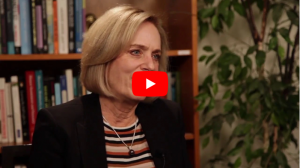Why Domestic Violence Occurs and How to Stop It

October is Domestic Violence Awareness Month, and with domestic violence on the rise, it is an important time to face this difficult issue. This year, the nationwide Mary Kay Truth About Abuse Survey showed that “8 out of 10 domestic violence shelters nationwide reported an increase in women seeking help.” The economy has had an effect. Not only is demand up while “funding, services and prevention efforts are down,” but the survey went on to report that “74 percent of women stayed with an abuser longer for economic reasons, [and] 58 percent of shelters reported that the abuse is more violent now than before the economic downturn.”
While financial factors contribute to the problem, the causes of domestic violence involve psychological issues that we must deal with in order to stop the cycle of abuse. There are two emotional dynamics that contribute greatly to domestic violence. One involves a destructive thought process (or “critical inner voice“) that abusers experience both toward themselves and their partners, thoughts like “You’re not a man if you don’t control her,” or “She is making a fool out of you.” The other factor involves a harmful illusion of connection between a couple, what my father, psychologist Robert Firestone, has referred to as a “fantasy bond.” This dynamic feeds into a sense that another person can make you whole and is responsible for your happiness. These two dangerous belief systems set up an environment for abuse.
While women are more likely to experience domestic violence, forms of abuse occur between all kinds of couples, whether of the opposite or same sex, married or unmarried. In fact, according to the Bureau of Justice Statistics Crime Data Brief in 2003, “Men account for approximately 15 percent of the victims of reported intimate partner violence.” However, in the many cases in which men become violent toward women, it’s valuable to examine certain societal attitudes toward men that are destructive and can increase instances of violence.
While many advances have been made toward creating equality between the sexes, we still live in a patriarchal society. Expectations that men should be strong, masculine, and more powerful than women can be very destructive to a man at risk for becoming violent. The shame triggered by the idea that they are appearing weak or unmanly can trigger some men to become enraged or to act on violent impulses.
Being challenged by a relationship partner can be distressing, arousing fear and anger for some people. In these instances, whether they are experiencing an insult, a perceived threat, or an extreme provocation, both men and women who engage in domestic violence are very often acting on their “critical inner voice.” This “voice” is a destructive thought process in which people are telling themselves negative things about themselves and their partners. The more a person listens to these thoughts, the more they feed feelings of being wronged and of needing to retaliate, sometimes escalating to a point of becoming violent. Examples of such thoughts include:
- “She/he is controlling you. Don’t let her/him act like you are weak.”
- “She/he is making fun of you. Who does she/he think she/he is?”
- “How dare he/ she treat you this way! If he/she really loved you he/she would…”
- “She’s/he’s probably cheating on you. You are such a sucker.”
In addition to listening to this critical inner voice, couples involved in domestic violence have often forged a destructive connection, an illusion that they cannot live without each other. There is a feeling of merged identity between the couple, in which both partners do not feel they can stand on their own without the other. This illusion contributes to what we call a “fantasy bond.” This unhealthy feeling of fusion makes it difficult for a couple to break free from the relationship, even after it has become hostile or dangerous. It also makes it easier for a couple to abuse each other, as they begin to see each other as extensions of themselves and not as separate individuals who they are hurting.
The formation of a fantasy bond further encourages the attitude that one person can define or victimize another person in some way. It also supports the idea that one partner in a couple has power or control over the other. Thus, people are more likely to feel entitled, mistreated, and righteous in their anger toward their partner. It sets the stage for rejection to be experienced as potentially life-threatening, intensifying reactions to any perceived threat of abandonment. A person may feel desperate to get the partner “back in line” because of feelings of not being able to live without him or her. The lack of personal responsibility, separateness, and accountability that results from a fantasy bond can provide a gateway to acting out emotional or physical abuse.
If we want to prevent domestic violence, we have to look at what works. San Francisco’s Manalive program has been successful in teaching male prisoners and domestic violence offenders in the community techniques to identify when they get triggered and to hit the “pause button” at those moments of stress. These men are then able to make more reasonable decisions in terms of their behavior. The program directly challenges the destructive thoughts and critical inner voices that feed aggressive behaviors.
This approach involves a person taking 100 percent responsibility for his or her actions. It means identifying the moments when they are triggered and realizing that no matter how provoked or infuriated they might feel toward their partner, these emotions will not kill them. The program teaches them about the division in themselves between a real self and an “anti-self” (incorporated from their own early experiences of violence). They learn that at those moments of stress when they get triggered, they have a choice — they can either stay with the open, vulnerable side of themselves or act out the defended “hit man identity” they’ve incorporated by identifying with the person or persons who abused them as children.
These individuals learn to calm themselves down and not get swept up in the barrage of critical inner voices, feeding their aggressive feelings and even instructing them to act out violence. They learn to recognize and acknowledge their feelings and to take responsibility by not acting on them, and instead acting in their best interest. They develop the ability to have an equal dialogue with their partner by asking their partner for what they want from them, rather than expecting or demanding that the other person meet their needs.
We are all capable of being who we want to be in our relationships. Help is available for both victims and perpetrators of abuse. Programs like Manalive have helped rehabilitate men who’ve been violent by helping them get to know their real self, teaching them to recognize their emotions, and enabling them to feel compassion and forgiveness for themselves and others. They gain a sense of themselves as separate individuals, thus cultivating self-esteem, responsibility and empathy. They learn effective strategies for recognizing when they get triggered and for not going down the destructive cycle toward violence, steering away from listening to their dangerous critical inner voice and instead staying in the point of view of their real self
Many people who commit abuse were either abused themselves as children or witnessed abuse between family members. To break this cycle and to reduce the cases of domestic violence in the generations to come, we have to implement programs that are effective and help violent perpetrators get the knowledge and help they need to not create the next generation of violent individuals in their children. Rehabilitation programs that emphasize self-reflection, self-control, and empathy, and that build resilience, can allow them instead to offer their children love, concern and tenderness. That way, even in times of economic strain, people will have the psychological understanding and coping skills to avoid turning to violence.
If you or a loved one is in trouble, call the National Domestic Violence Hotline -1-800-799-SAFE (7233).
On Nov. 12, you can attend a free Webinar with Dr. Lisa Firestone, featuring violence expert Dr. James Gilligan on “Why Does Violence Occur and How Can We Prevent It?”
Learn more or register here
Tags: destructive relationship, domestic violence, violence










Leave a Reply
You must be logged in to post a comment.